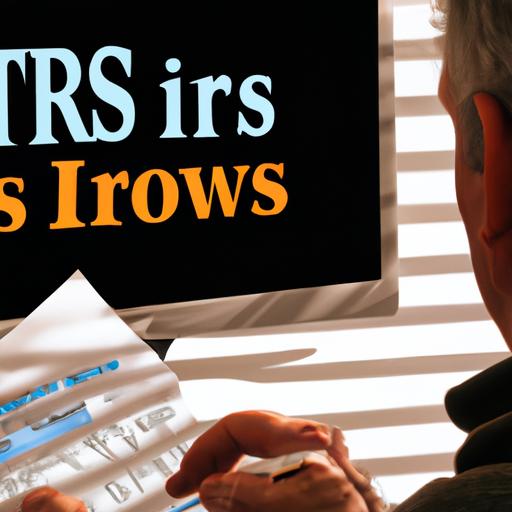Are you moving soon and wondering if the United States Postal Service (USPS) will forward your government mail? You’re not alone. The IRS and other government agencies frequently send important mail, and it’s crucial to know whether USPS will forward it to your new address. In this article, we’ll explore the USPS forwarding process and answer the question, “Does USPS forward IRS & other government mail in 2023?”
Introduction

First, let’s define USPS forwarding. When you move, USPS forwarding services allow you to redirect your mail to a new address for a specified amount of time. It’s important to use this service to ensure you receive all your mail, including government mail, at your new address. The IRS and other government agencies frequently mail important documents, such as tax refunds, notices, and identification cards, so it’s crucial to keep your address up-to-date.
USPS Forwarding Services

USPS offers several forwarding services, including temporary, permanent, and premium forwarding. Temporary forwarding is free and lasts up to six months, while permanent forwarding is a paid service that forwards your mail indefinitely. Premium forwarding is a paid service that allows you to receive mail at a different address on a weekly basis.
When you submit a change of address with USPS, they forward all your mail, including government mail, to your new address. However, if you don’t update your address with the IRS and other government agencies, they won’t have your new address on file, and your mail won’t be forwarded.
Stay tuned for the next section, where we’ll explore how the IRS handles mail forwarding for taxpayers and businesses.
USPS Forwarding Services

Moving can be a daunting task, and it’s easy to overlook the importance of updating your address with USPS and other government agencies. Fortunately, USPS offers several forwarding services to ensure your mail follows you to your new address.
Explanation of USPS Forwarding Services
As mentioned in the previous section, USPS offers temporary, permanent, and premium forwarding services. Temporary forwarding is ideal for short-term moves and is free of charge. Permanent forwarding, on the other hand, is a paid service that forwards your mail indefinitely. Premium forwarding is a paid service that allows you to receive mail at a different address on a weekly basis.
Overview of the USPS Change of Address Process
To take advantage of USPS forwarding services, you’ll need to submit a Change of Address (COA) form. The COA form can be completed online, in person at a post office, or via mail. You’ll need to provide your old and new address, a valid email address, and a valid credit or debit card to verify your identity.
Benefits of Using USPS Forwarding Services
Using USPS forwarding services offers several benefits. First and foremost, it ensures you receive all your mail, including government mail, at your new address. It also helps prevent identity theft by ensuring your personal information doesn’t fall into the wrong hands. Additionally, it saves you time and hassle by redirecting your mail to your new address, so you don’t have to manually update your address with every individual or organization that sends you mail.
Stay tuned for the next section, where we’ll explore how the IRS handles mail forwarding for taxpayers and businesses.
IRS Mail Forwarding
Have you recently moved and need to update your address with the Internal Revenue Service (IRS)? It’s crucial to keep your address up-to-date with the IRS to ensure you receive important tax documents, such as refunds, notices, and forms. Let’s explore how the IRS handles mail forwarding for taxpayers and businesses.
How the IRS Handles Mail Forwarding
The IRS does not participate in the USPS forwarding process. If you move, it’s your responsibility to update your address with the IRS to ensure you receive your mail. The IRS won’t forward your mail to your new address, so it’s important to file a change of address with the IRS as soon as possible.
Overview of the IRS Change of Address Process
To update your address with the IRS, you can file Form 8822, Change of Address, or use the online IRS Change of Address tool. It’s important to note that if you’re married, both you and your spouse must sign the form if you file a joint return.
If you’re expecting a refund, it’s crucial to update your address before the IRS processes your return. If the IRS sends your refund to the wrong address, it may be difficult to recover.
How to Update Your Address with the IRS
To update your address with the IRS, you can file Form 8822, Change of Address, by mail or use the online IRS Change of Address tool. If you file by mail, it may take the IRS four to six weeks to process your request. If you use the online tool, your address will be updated immediately.
In conclusion, it’s crucial to update your address with the IRS when you move to ensure you receive important tax documents. The IRS does not participate in the USPS forwarding process, so it’s your responsibility to update your address promptly.
Other Government Mail Forwarding
In addition to the IRS, other government agencies also send important mail that you’ll want to receive at your new address. These agencies include the Social Security Administration, Medicare, and the Department of Veterans Affairs, among others.
How other government agencies handle mail forwarding
Each government agency has its own process for handling mail forwarding. Some agencies, such as the Social Security Administration, will automatically update your address when you submit a change of address with USPS. Others, such as Medicare, require you to update your address directly with them.
Overview of the Change of Address process for other government agencies
To ensure you receive all your government mail at your new address, it’s important to update your address with each agency individually. You can often do this online or by mail. Some agencies may require additional documentation, such as proof of identity or residency, so it’s important to check their specific requirements.
Examples of other government mail forwarded by USPS
In addition to the IRS, USPS can forward mail from other government agencies, such as the Department of Commerce and the Department of Education. Examples of government mail that may be forwarded include benefits statements, identification cards, and licenses.
It’s important to note that not all government mail can be forwarded. For example, if you receive a jury summons or a legal notice, you’ll need to update your address directly with the issuing court or agency.
Now that we’ve covered how other government agencies handle mail forwarding, let’s move on to the next section, where we’ll address common questions and concerns about USPS forwarding and government mail forwarding.
Common Questions and Concerns
As with any service, there may be questions and concerns surrounding USPS forwarding and government mail forwarding. Below, we’ve compiled answers to some common questions and addressed concerns about privacy and security.
Answers to Common Questions
Q: How long does it take for my mail to start forwarding?
A: USPS forwarding typically begins within 7-10 days of submitting a change of address request. However, it’s important to note that not all mail may be forwarded, especially if it’s addressed incorrectly or if the forwarding period has expired.
Q: Will forwarding my mail affect my credit score?
A: No, forwarding your mail will not affect your credit score.
Q: Can I forward someone else’s mail to my address?
A: No, forwarding someone else’s mail without their permission is illegal. If you receive mail for someone else, you should write “Return to Sender” on the envelope and place it back in the mailbo
Addressing Concerns about Privacy and Security
Some individuals may be concerned about privacy and security when it comes to USPS forwarding and government mail forwarding. Here are some ways to address these concerns:
- Only submit a change of address with USPS if you’re the person who is moving. Don’t submit a change of address for someone else.
- Always update your address with government agencies, such as the IRS, to ensure your mail is forwarded to the correct address.
- If you’re concerned about sensitive information being forwarded to your new address, consider renting a P.O. box or using a mail forwarding service that specializes in forwarding government mail. These services may offer additional security measures to protect your information.
- Monitor your accounts and credit report regularly to ensure no fraudulent activity occurs.
By following these tips, you can ensure your mail is forwarded securely and your privacy is protected.
Conclusion
In conclusion, it’s essential to keep your address up-to-date with USPS and other government agencies to receive important mail. USPS forwarding services are available to help redirect your mail to your new address, including government mail sent by the IRS and other agencies.
Remember to submit a change of address with USPS when you move, and update your address with the IRS and other government agencies to ensure you receive all your mail. Don’t miss important documents, notices, or identification cards just because you forgot to update your address.
By following these simple steps, you can rest assured that your mail, including government mail, will be forwarded to your new address. If you have any further questions or concerns, don’t hesitate to reach out to USPS or the relevant government agency for assistance.
